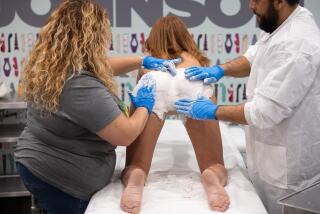Johnson & Johnson Will Buy Rival : Firm to Pay $726 Million for Playtex Tampon Subsidiary
NEW YORK â Johnson & Johnson, in a move that will give it a major share of the lucrative sanitary protection market, said Tuesday that it agreed to buy for $726 million the Playtex Holdings Inc. subsidiary that makes tampons.
The unit, Playtex Family Products, is the second-largest U.S. maker of tampons with a 25% market share and the most profitable of Stamford, Conn.-based Playtexâs three subsidiaries.
Johnson & Johnson now has about 6% of the U.S. market with its o.b. tampons, analysts said. However, the o.b. tampons are not popular among U.S. women because they lack a plastic applicator, which Playtex tampons have. Overseas, the o.b. tampon has a larger following, accounting for about $150 million in annual sales, analysts said.
Tambrands Inc., which makes Tampax tampons, leads the market with a share exceeding 45%.
âWith the acquisition Johnson & Johnson is eliminating one of their competitors and dramatically improving the profitability of one of their businesses,â said Barbara Ryan, an analyst with Bear, Stearns & Co.
Johnson & Johnson shares rose $2.25 to close at $82 in New York Stock Exchange trading Tuesday.
Tampons make up the fastest growing and most profitable segment of the $1.5-billion sanitary protection market, according to analysts. Over 12 billion units of sanitary napkins and tampons are sold each year in the United States, with tampons accounting for about a third of the retail market.
Playtex Family Products makes and markets Playtex tampons, Playtex disposable nursers, Playtex Living and Handsaver gloves, and Tek toothbrushes.
Joel Smilow, Playtex chief executive, declined to disclose the unitâs sales, but analysts said its tampons accounted for about $300 million to $325 million in sales last year and its operating profit far exceeded 30% of sales.
Playtex Holdings is a private company acquired from a unit of BCI Holdings on Dec. 12, 1986, in a leveraged buyout.
The planned purchase does not include Playtex Apparel Inc., maker of the Cross Your Heart bra as well as other womenâs undergarments. The sale also excludes Playtex Jhirmack Inc., which makes hair care products, primarily shampoos and conditioners under the Jhirmack trademark.
Smilow said the sale of the family products unit would place Playtex in a position to reduce its acquisition debt. It also will allow the company to focus primary attention on its worldwide apparel business, which has sales and operating profits of about $300 million and $45 million, respectively.
Smilow said the apparel unit was relatively unprofitable and Playtex has no plans to sell the unit.
Analysts said the acquisition will nicely complement Johnson & Johnsonâs sanitary napkin business, where it is the market leader with a 45% share. Johnson & Johnsonâs sanitary pads include the Stayfree and Sure & Natural brands.
Analysts also said Playtex will boost operating profits in the Johnson & Johnson consumer products division.
âIt is strategically a good move for the company,â said Larry Feinberg, an analyst who follows the company for Drexel Burnham Lambert. He said the purchase, expected to be closed in the third quarter, should not dilute Johnsonâs earnings.
In 1986, Johnson & Johnson earned $329.5 million on sales of $7 billion, which included a charge for the sale of the companyâs Technicare diagnostics unit.
Analysts expect Johnson to earn about $830 million on sales of $8 billion in 1987.
More to Read
Inside the business of entertainment
The Wide Shot brings you news, analysis and insights on everything from streaming wars to production â and what it all means for the future.
You may occasionally receive promotional content from the Los Angeles Times.










